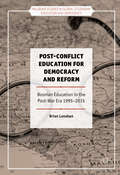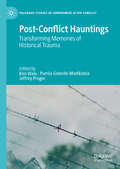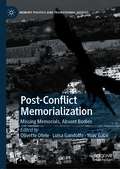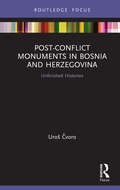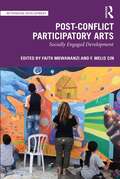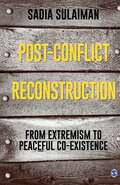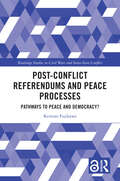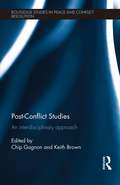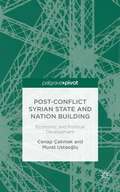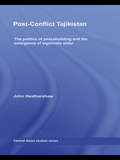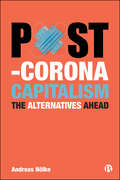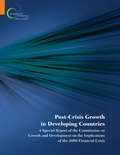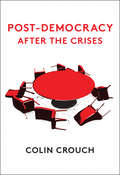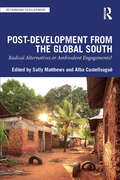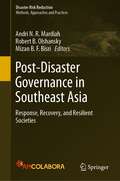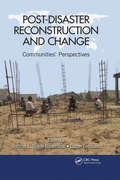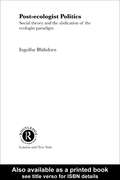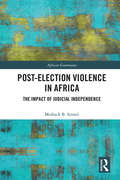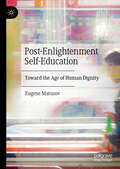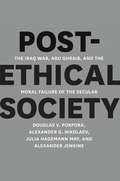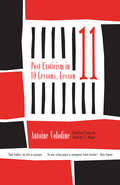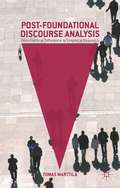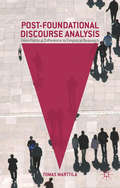- Table View
- List View
Post-Conflict Education for Democracy and Reform: Bosnian Education in the Post-War Era, 1995–2015 (Palgrave Studies in Global Citizenship Education and Democracy)
by Brian LanahanThis book examines the history of Bosnia and post-conflict Bosnian education in the setting of a society very much still politically divided. Bosnia and Herzegovina (BiH) serves as the perfect case study for examining how education evolves within the context of massive state-building efforts and mass educational reform. Focusing on issues central to successful education in a democracy, Lanahan highlights the importance of the governance structures of the Dayton Peace Accords, the split nature of education in BiH, the international community’s involvement in education, teacher education, and higher education reform.Drawing on a wealth of research by national and international experts, this book provides an engaging and timely study of global governance, regional integration, and oversight by the international community over a 20-year period for policymakers to consider as they continue to create policy for other emerging democracies. Both academics and practitioners in the field of international education and development will find this an invaluable text.
Post-Conflict Hauntings: Transforming Memories of Historical Trauma (Palgrave Studies in Compromise after Conflict)
by Pumla Gobodo-Madikizela Jeffrey Prager Kim WaleThis book engages the globally pressing question of how to live and work with the haunting power of the past in the aftermath of mass violence. It brings together a collection of interdisciplinary contributions to reflect on the haunting of post-conflict memory from the perspective of diverse country case studies including South Africa, Rwanda, Zimbabwe, Northern Ireland, North and South Korea, Palestine and Israel, America and Australia. Contributions offer theoretical, empirical and practical insights on the nature of historical trauma and practices of collective healing and repair that include embodied, artistic and culturally relevant forms of wisdom for dealing with the past. While this question has traditionally been explored through the lens of trauma studies in relation to the post-Holocaust experience, this book provides new understandings from a variety of different historical contexts and disciplinary perspectives. Its chapters draw on, challenge and expand the trauma concept to propose more contextually relevant frameworks for transforming haunted memory in the aftermath of historical trauma.
Post-Conflict Literature: Human Rights, Peace, Justice (Routledge Interdisciplinary Perspectives on Literature)
by Chris Andrews Matt McGuireThis book brings together a variety of perspectives to explore the role of literature in the aftermath of political conflict, studying the ways in which writers approach violent conflict and the equally important subject of peace. Essays put insights from Peace and Conflict Studies into dialog with the unique ways in which literature attempts to understand the past, and to reimagine both the present and the future, exploring concepts like truth and reconciliation, post-traumatic memory, historical reckoning, therapeutic storytelling, transitional justice, archival memory, and questions about victimhood and reparation. Drawing on a range of literary texts and addressing a variety of post-conflict societies, this volume charts and explores the ways in which literature attempts to depict and make sense of this new philosophical terrain. As such, it aims to offer a self-conscious examination of literature, and the discipline of literary studies, considering the ability of both to interrogate and explore the legacies of political and civil conflict around the world. The book focuses on the experience of post-Apartheid South Africa, post-Troubles Northern Ireland, and post-dictatorship Latin America. The recent history of these regions, and in particular their acute experience of ethno-religious and civil conflict, make them highly productive contexts in which to begin examining the role of literature in the aftermath of social trauma. Rather than a definitive account of the subject, the collection defines a new field for literary studies, and opens it up to scholars working in other regional and national contexts. To this end, the book includes essays on post-1989 Germany, post-9/11 United States, the Israeli-Palestinian conflict, Sierra Leone, and narratives of asylum seeker/refugee communities. This volume’s comparative frame draws on well-established precedents for thinking about the cultural politics of these regions, making it a valuable resource for scholars of Comparative Literature, Peace and Conflicts Studies, Human Rights, Transitional Justice, and the Politics of Literature.
Post-Conflict Memorialization: Missing Memorials, Absent Bodies (Memory Politics and Transitional Justice)
by Luisa Gandolfo Olivette Otele Yoav GalaiAs the world negotiates immense loss and questions of how to memorialize, the contributions in this volume evaluate the role of culture as a means to promote reconciliation, either between formerly warring parties, perpetrators and survivors, governments and communities, or within the self. Post-Conflict Memorialization: Missing Memorials, Absent Bodies reflects on a distinct aspect of mourning work: the possibility to move towards recovery, while in a period of grief, waiting, silence, or erasure. Drawing on ethnographic data and archival material from Bosnia-Herzegovina, Argentina, Palestine, Israel, Wales, Peru, Colombia, Hungary, Chile, Pakistan, and India, the authors analyze how memorialization and commemoration is practiced by communities who have experienced trauma and violence, while in the absence of memorials, mutual acknowledgement, and the bodies of the missing. This timely volume will appeal to undergraduate and postgraduate students, postdoctoral researchers, and scholars with an interest in memory studies, sociology, history, politics, conflict, and peace studies
Post-Conflict Monuments in Bosnia and Herzegovina: Unfinished Histories (Routledge Focus on Art History and Visual Studies)
by Uroš ČvoroAt a time of dramatic struggles over monuments around the world, this book examines monuments that have been erected in post-conflict Bosnia and Herzegovina (BiH) since 1996. Examining the historical precedents for the high rate of monumentbuilding, and its links to ongoing political instability and national animosity, this book identifies the culture of remembrance in BiH as symptomatic of a broader shift: a monumentalisation and privatisation of history. It provides an argument for how to account for the politics of contemporary nation-state formation, control of space, trauma and revisions of history in a region that has been subject to prolonged instability and crisis. This book will be of interest to scholars in contemporary art, museum studies, war and conflict studies, and European studies.
Post-Conflict Participatory Arts: Socially Engaged Development (Rethinking Development)
by Faith MkwananziThis book investigates the power of art to enhance human development and to initiate positive social change for individuals and societies recovering from conflict. Interventions aimed at reinforcing social justice and bringing communities together after conflict are often accused of being top-down, or failing to consider all groups and contexts within a society. The use of participatory arts can help to address these challenges by fostering community engagement, social cohesion, influencing public policy, and ultimately, advancing social justice. Arts-based methods can be particularly effective at reaching youth communities, providing voice and political agency to young people who are often not given a platform. Situated at the intersection of participatory arts, social and epistemic justice, this book brings together case studies from across the world to reflect on best practice for the use of bottom-up, participatory, co-produced, and co-designed arts processes in conflict settings. This book provides an important guide to the role that arts can play in addressing epistemic injustice and contributing to social justice and human development. As such, it will be of interest to international development and arts practitioners, policy makers, and to students and researchers across participatory arts, youth studies, international development, social justice, and peace and conflict studies.
Post-Conflict Reconstruction: From Extremism to Peaceful Co-Existence
by Sadia SulaimanPost-Conflict Reconstruction: From Extremism to Peaceful Co-Existence is a comprehensive presentation on the root causes of state fragility, which provides an enabling environment for violent religious extremism. It addresses various security, political, socio-economic and external factors that contribute to state fragility, which is further enhanced in a conflict environment. The book deals closely with the use of violence due to ideological, religious and political reasons. By analyzing the situations in the post-conflict states of Afghanistan, Iraq, Yemen, Pakistan, Nigeria and Libya, the book establishes the co-relationship between state fragility and religious extremism in post-conflict settings. The book emphasizes the need to address the grievances of marginalized sections in all countries with fragile state structures that usually take to violence to make their voices heard. It also highlights the imperative for swift rehabilitation of poor people—who typically bear the brunt of conflicts and are often displaced forcefully—for restoring peace and security, and averting future disturbance.
Post-Conflict Referendums and Peace Processes: Pathways to Peace and Democracy? (Routledge Studies in Civil Wars and Intra-State Conflict)
by Kentaro FujikawaThis book provides a comparative study of the impact of referendums on conflict resolution and peacebuilding in post-conflict societies.Post-conflict referendums have increasingly been held as part of peace processes. While policy-makers are hopeful that these referendums serve peace and democracy, the burgeoning literature on them has expressed significant reservations about their use, particularly on territorial issues, because referendums do not have mechanisms for compromise. To gauge the actual impact of these referendums on peace processes, the book systematically compares three post-conflict referendums on self-determination held with their respective central governments’ consent, in Eritrea, East Timor, and Southern Sudan. Relying on more than 70 elite interviews, it examines (1) the rationales behind the decision to hold referendums; (2) the referendums’ impact on resolving the original self-determination conflicts; and (3) their impact on post-conflict peacebuilding inside the newly independent states. The three case studies reveal various rationales behind such referendums, and show that referendums play a limited, albeit positive, role in settling the original conflicts. Furthermore, holding referendums after civil wars has various positive, negative, and often unexpected impacts on domestic and international peacebuilding efforts inside newly independent states. This book provides careful, thorough, and well-balanced accounts of these referendums’ impact on peace processes.This book will be of much interest to students of peace and conflict studies, African and South-East Asian politics, and International Relations.Chapter 1 of this book is freely available as a downloadable Open Access PDF at http://www.taylorfrancis.com under a Creative Commons Attribution-Non Commercial-No Derivatives (CC-BY-NC-ND) 4.0 license.
Post-Conflict Studies: An Interdisciplinary Approach (Routledge Studies in Peace and Conflict Resolution)
by Keith Brown Chip GagnonThis book examines how the violence of conflict is transformed in the post-conflict period. Post-conflict studies seek to illuminate, theorise, and narrate the processes by which societies transition from periods of overt and violent conflict to periods of relative stability and peace. Most of the research carried out on post-conflict societies has taken place within disciplinary bounds. In contrast, this volume breaches those boundaries; though each author is grounded in a particular discipline, the chapters have been written in a spirit of interdisciplinarity. The focus of the volume is how the violence of conflict is transformed in the post-conflict period into processes that the editors have categorised as criminalisation, medicalisation and missionisation. Comprised of essays written by a diverse group of scholars and activists from anthropology, political science, international relations, law, education, religion, and military history, each section of the book looks at the concept of post-conflict in a way that problematises its common usage and highlights the importance of strongly interdisciplinary research into post-conflict societies. This book will be of interest to students of war and conflict studies, peace studies, security studies and IR in general.
Post-Conflict Syrian State and Nation Building: Economic and Political Development
by Cenap Çakmak Murat UstaoğluBased on extensive field work involving the leading figures of the diverse Syrian National Coalition, an umbrella initiative of opposition groups fighting against the Assad regime, this study critically evaluates the challenges ahead as well as the inherent opportunities for the post-conflict era in Syria.
Post-Conflict Tajikistan: The politics of peacebuilding and the emergence of legitimate order (Central Asian Studies #Vol. 16)
by John HeathershawPost-Soviet, post-conflict Tajikistan is an under-studied and poorly understood case in conflict studies literature. Since 2000, this Central Asian state has seen major political violence end, countrywide order emerge and the peace agreement between the parties of the 1990s civil war hold. Superficially, Tajikistan appears to be a case of successful international intervention for liberal peacebuilding, yet the Tajik peace is characterised by authoritarian governance. Via discourse analysis and extensive fieldwork, including participant-observation with international organizations, the author examines how peacebuilding is understood and practised. The book challenges received wisdom that peacebuilding is a process of democratisation or institutionalisation, showing how interventions have inadvertently served to facilitate an increasingly authoritarian peace and fostered popular accommodation and avoidance strategies. Chapters investigate assistance to political parties and elections, the security sector and community development, and illustrate how transformative aims are thwarted whilst ‘success’ is simulated for an audience of international donors. At the same time the book charts the emergence of a legitimate order with properties of authority, sovereignty and livelihoods. Providing a challenge to the theoretical literature on peacebuilding and concentrating on an under-studied Central Asian state, this book will be of interest to academics working on Peace Studies, International Relations and Central Asian Studies.
Post-Corona Capitalism: The Alternatives Ahead
by Andreas NölkeThe COVID-19 pandemic is a Rorschach test for society: everyone sees something different in it, and the range of political and economic responses to the crisis can leave us feeling overwhelmed. This book cuts through the confusion, dissecting the new post-coronavirus capitalism into several policy areas and spheres of action to inform academic, policy and public discourse. Covering all the major aspects of contemporary capitalism that have been affected by the pandemic, Andreas Nölke deftly analyses the impacts of the crisis on our socio-economic and political systems. Signposting a new era for global capitalism, he offers alternatives for future economic development in the wake of COVID-19.
Post-Crisis Growth in Developing Countries
by Commission on Growth and DevelopmentThe 2008 financial crisis has raised a number of questions about the best strategy for achieving sustained growth and poverty reduction in developing countries, foremost among them whether the failure of the financial system also signifies the broader failure of market-oriented capitalist systems. The Growth Commission believes that the crisis was not a failure of market-oriented systems and that an outward-looking strategy, as suggested in the original Growth Report (published in May 2008), remains broadly valid. The following questions are discussed in this special report: - How has the economic landscape changed in the wake of the financial crisis of 2008? - What factors contributed to the onset of the financial crisis and its transmission from advanced to developing countries? - Should the crisis be interpreted as a failure of financial-sector regulation or as a broader failure of market-based systems? - What effects will the financial crisis have on the prospects for economic growth in developing countries? - How will the crisis impact the formulation of developing country growth strategies going forward? - What is the outlook for free trade and a growth model that capitalizes on the global economy? - How do actions by the advanced economies in response to the crisis affect the choices of policy makers in the developing world? - What is the appropriate role of government in the post-crisis economy? - How will the lessons of the crisis affect strategies for financial-sector development in developing countries? - What are the prospects for improved international oversight of global finance and cross-border financial flows?
Post-Democracy After the Crises
by Colin CrouchIn Post-Democracy (Polity, 2004) Colin Crouch argued that behind the façade of strong institutions, democracy in many advanced societies was being hollowed out, its big events becoming empty rituals as power passed increasingly to circles of wealthy business elites and an ever-more isolated political class.Crouch’s provocative argument has in many ways been vindicated by recent events, but these have also highlighted some weaknesses of the original thesis and shown that the situation today is even worse. The global financial deregulation that was the jewel in the crown of wealthy elite lobbying brought us the financial crisis and helped stimulate xenophobic movements which no longer accept the priority of institutions that safeguard democracy, like the rule of law. The rise of social media has enabled a handful of very rich individuals and institutions to target vast numbers of messages at citizens, giving a false impression of debate that is really stage-managed from a small number of concealed sources. Crouch evaluates the implications of these and other developments for his original thesis, arguing that while much of his thesis remains sound, he had under-estimated the value of institutions which are vital to the support of a democratic order. He also confronts the challenge of populists who seem to echo the complaints of Post-Democracy but whose pessimistic nostalgia brings an anti-democratic brew of hatred, exclusion and violence.
Post-Development from the Global South: Radical Alternatives or Ambivalent Engagements? (Rethinking Development)
by Sally MatthewsPost-development advocates and decolonial thinkers are calling for radical alternatives to development, but how do these ideals sit with the day-to-day reality of marginalised communities struggling with poverty, precarity, and the deprivation of human rights?This book investigates how post-development alternatives are being understood and negotiated on the ground in the Global South. Indigenous concepts and practices attributed to people in the Global South are seen by post-development thinkers as offering transformative alternatives to dominant development models of progress and economic growth. For example, buen vivir from particular regions of South America points to a ‘culture of life’ and ubuntu in Southern Africa emphasises human connectedness and mutuality. Such terms are associated with social and environmental sustainability, and a greater connection to Southern epistemologies. Drawing on extensive fieldwork, this book takes us directly to Global South communities from around the world, to consider the complex ways in which they negotiate the ideas and practices associated with (post)development, and their views on the supposed indigenous alternatives. The book encourages a contextual approach that embraces the tensions and contradictions that exist within different communities.Taking the reader from abstract post-development theory right into the heart of communities directly impacted by development, this book will be an important guide for students, researchers and practitioners looking for better ways to address the desires and aspirations of marginalised communities in the Global South.
Post-Disaster Governance in Southeast Asia: Response, Recovery, and Resilient Societies (Disaster Risk Reduction)
by Robert B. Olshansky Mizan B. F. Bisri Andri N. R. MardiahThis book aims to provide insight into how Southeast Asian countries have responded to disasters, recovered, and rebuilt. It investigates emergency response and disaster recovery cases at national levels and from regional perspectives. Recovery from great disasters poses great challenges to affected countries in terms of organization, financing, and opportunities for post-disaster betterment. Importantly, disasters are critical moments in which to achieve disaster risk reduction, especially in the context of climate change and Sustainable Development Goals. Insights from these cases can help other countries better prepare for response and recovery before the next disaster strikes. While the experiences of disaster risk reduction and climate change implementation in Southeast Asian countries have been well documented, tacit knowledge from emergency response and recovery from these countries has not been transformed into explicit knowledge. There are only a few books that integrate information and lessons from post-disaster governance in Southeast Asia as a region, and because of the importance of providing real and recent situations, this book will interest many policymakers, practitioners, and academics. The information presented here will lead to a better understanding of how to plan for future disasters and improve governance to ensure effective emergency response as well as encouraging a build back better and safer towards a more resilient and sustained recovery.
Post-Disaster Reconstruction and Change: Communities' Perspectives
by Jennifer E. Duyne Barenstein Esther LeemannSuccessful recovery following a disaster depends upon transcending the disciplinary divides of architecture, engineering, and planning and emphasizing the importance of community perspectives in the post-disaster reconstruction process. Effective results in community recovery mandate that we holistically examine the complex interrelationship betwee
Post-EEG-Anlagen in der Energiewirtschaft: Praxishilfe für Energieversorgungsunternehmen und Anlagenbetreiber zum Umgang mit ausgeförderten Anlagen
by Marcel LinnemannBetreiber von Anlagen, die unter das EEG fallen, werden vor der Frage stehen, wie der weitere Betrieb sicherzustellen ist. Dieses Buch zeigt die Möglichkeiten zur Vermarktung solcher Anlagen für Energieversorger und Anlagenbetreiber auf, bespricht die Hintergründe sowie die Vertragsgestaltung. Messkonzepte für unterschiedliche Vermarktungskonzepte (Volleinspeisung, Überschusseinspeisung) sowie die regulatorische Einordung (Steuern, EEG Umlage ect.) sind ebenso berücksichtigt.
Post-Ecologist Politics: Social Theory and the Abdication of the Ecologist Paradigm (Routledge Innovations in Political Theory)
by Ingolfur BlühdornSince the late 1980s, ecological thought and the European eco-movement have gone through a phase of fundamental transformation which has been widely acknowledged but not yet theorised in any satisfactory way. This important text questions why radical ecological criticism has had so little impact on contemporary society, despite the urgency of the issues it highlights. The book offers a challenging theoretical critique of ecological thought itself.
Post-Election Violence in Africa: The Impact of Judicial Independence (African Governance)
by Meshack SimatiThis book explores the effect of the judiciary on the incidence of post-election violence by political actors across Africa and within African countries. It examines how variation in judicial independence can constrain or incentivize election violence among democratizing states. Using case studies and cross-national analysis, the book shows that variation in levels of judicial independence from a non-independent judiciary to a quasi-independent judiciary or from a fully independent judiciary to quasi-independent judiciary increases the likelihood of strategic use of post-election violence by non-state actors. However, the likelihood of post-election violence is significantly reduced in non-independent judiciaries or once countries’ judiciaries become fully independent. The author makes the theoretical argument that, within unconsolidated states, non-state actors that view the judiciary as semi-independent are more likely to engage in post-election violence with the purpose of creating political and professional uncertainty in order to influence assertive behaviour from judges in disputed elections. Consequently, the book argues that semi-independent judiciaries or judiciaries that are neither fully controlled by the incumbent nor fully independent from the incumbent can help explain post-election violence among unconsolidated states, all else being equal. This book will be of interest to scholars of election violence, democratic politics, law and politics and African politics.
Post-Enlightenment Self-Education: Toward the Age of Human Dignity
by Eugene MatusovThe book aims to challenge and redefine the traditional Enlightenment approach to education by advocating for a Post-Enlightenment model that emphasizes self-education rooted in individual autonomy, dignity, and diverse experiences. It critiques the Enlightenment's narrow focus on rationality and hierarchy, proposing a more inclusive and personalized method that values emotional intelligence and contextual understanding. The book seeks to promote a radical shift towards educational pluralism, where learning is driven by the learner's own needs, interests, and judgments, rather than imposed by external authorities. Ultimately, it calls for a reimagined educational paradigm that aligns with the principles of universal human dignity and autonomy, envisioning a future where education is a personal and existential pursuit supported by democratic societal structures.
Post-Ethical Society: The Iraq War, Abu Ghraib, and the Moral Failure of the Secular
by Douglas V. Porpora Alexander Nikolaev Julia Hagemann May Alexander JenkinsWeve all seen the images from Abu Ghraib: stress positions, US soldiers kneeling on the heads of prisoners, and dehumanizing pyramids formed from black-hooded bodies. We have watched officials elected to our highest offices defend enhanced interrogation in terms of efficacy and justify drone strikes in terms of retribution and deterrence. But the mainstream secular media rarely addresses the morality of these choices, leaving us to ask individually: Is this right? In this singular examination of the American discourse over war and torture, Douglas V. Porpora, Alexander Nikolaev, Julia Hagemann May, and Alexander Jenkins investigate the opinion pages of American newspapers, television commentary, and online discussion groups to offer the first empirical study of the national conversation about the 2003 invasion of Iraq and the revelations of prisoner abuse at Abu Ghraib a year later. "Post-Ethical Society" is not just another shot fired in the ongoing culture war between conservatives and liberals, but a pensive and ethically engaged reflection of Americas feelings about itself and our actions as a nation. And while many writers and commentators have opined about our moral place in the world, the vast amount of empirical data amassed in "Post-Ethical Society "sets it apart--and makes its findings that much more damning.
Post-Exoticism in Ten Lessons, Lesson Eleven
by J. T. Mahany Antoine Volodine"The interconnected works of Volodine--think Faulkner, but after an apocalypse--constitute the most exciting project in contemporary French literature."--Maria ClementiThat is what we had called post-exoticism. It was a construction connected to revolutionary shamanism and literature. . . . It was an interior construction, a withdrawal, a secret welcoming land, but also something offensive that participated in the plot of certain unarmed individuals against the capitalist world and its countless ignominies. This fight was now confined solely to Bassmann's lips.Like with Antoine Volodine's other works (Minor Angels, We Monks & Soldiers), Post-Exoticism in Ten Lessons, Lesson Eleven takes place in a corrupted future where a small group of radical writers--those who practice "post-exoticism"--have been jailed by those in power and are slowly dying off. But before Lutz Bassmann, the last post-exoticist writer, passes away, a couple journalists will try and pry out all the secrets of this powerful literary movement.With its explanations of several key "post-exoticist" terms that appear in Volodine's other books, Lesson Eleven provides a crucial entryway into one of the most ambitious literary projects of recent times: a project exploring the revolutionary power of literature.Antoine Volodine is the author of dozens of books under a few different pseudonyms, including Lutz Bassmann and Manuela Draeger. These novels--several of which are available in English--articulate a post-exoticist universe filled with secrets, revolutionary writers, and spiders.J. T. Mahany is a graduate of the University of Rochester's MA in Literary Translation Studies program and is currently enrolled in the MFA program at the University of Arkansas.
Post-Foundational Discourse Analysis: From Political Difference to Empirical Research
by Tomas MarttilaPost-Foundational Discourse Analysis.
Post-Foundational Discourse Analysis: From Political Difference to Empirical Research
by Tomas MarttilaThis book adds the missing link between post-foundational discourse theory and the methods of empirical research, and in doing so it develops a post-foundational discourse analysis research program. The book offers a structure of the research program, and explores the methodologization of other discourse analytical approaches.
